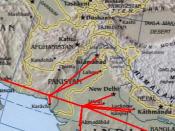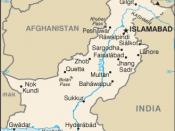Money is power, and given the United States has the largest Gross Domestic Product (GDP) among all civilized nations in the world, the United States has naturally come to the forefront of the global policing system. The flood of cash on which this nation was built is what provided for the huge investments in education and scientific research that have shaped America into the dominant nuclear power it is today. This dominant status, however, has indirectly tied America into two different potential nuclear wars. The first case is a conflict between Iran versus Israel and the second case involves India versus Pakistan. In the first case, Iran has been in a longstanding conflict with Israel. But now the conflict has become much more serious, as indicated by the Iranian leader, Mahmoud Ahmadinejad, when he literally said he wants Israel "wiped off the map." The conflict between India and Pakistan is by no means any less serious.
India and Pakistan have also been in a longstanding fight, particularly over a shared territory called Kashmir. Together, these two conflicts sound really bad, but they sound even worse when you add the fact that parties within these conflicts have (or are trying to have) nuclear capabilities. Being that America unofficially polices the world right now, America has a two-sided responsibility: To demand that Iran stop its nuclear weapons projects and to force Pakistan and India to agree their existent nuclear weapons will not be used in the event of war.
To understand the urgency behind the need for America to become effectively involved in these situations, it is important to look at the backgrounds of each of these conflicts. The base for Iran's nuclear program was planned in 1960 under the sponsorship of the United States (Iran WMD 3). A few years later,


